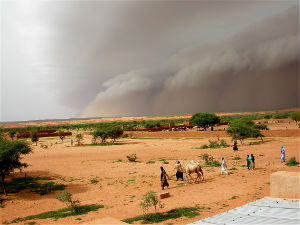Improving the accuracy of essential African weather forecasts
19 April 2017

A comprehensive new handbook about weather forecasting in West Africa could help safeguard lives and resources in the region.
Meteorology of Tropical West Africa: The Forecasters' Handbook was produced to help the region’s weather forecasters. It is the result of 15 years of collaborative international research, coordinated by the University of Leeds in collaboration with international researchers and meteorological agencies, including the Walker Institute at the University of Reading.
It results from the African Monsoon Multidisciplinary Analysis (AMMA), the biggest research programme into African weather and climate ever conducted, and includes theory, weather forecasting methods, and case studies of West African weather systems.
"The collaborative approach taken to produce the first ever forecasters handbook for West Africa is a roadmap for the future" - Professor Rosalind Cornforth, Walker Institute Director
Professor Rosalind Cornforth, Director of the Walker Institute at the University of Reading, said: “The two-way partnership is about working together to come up with climate resilient solutions. The vagaries of African weather can pose a threat to communities and the economy.
“The collaborative approach taken to produce the first ever forecasters handbook for West Africa is a roadmap for the future. It has woven together the expertise from our international research community with the deep experience of our colleagues in the operational community to move forecasting methodologies forward in a way that can help people respond better and earlier.”
Combining data with experience
Many of the new forecasting methods described in the handbook were developed as part of the training and coordination of 15 West African forecasters by Jean-Philippe Lafore from Météo France. These West African forecasters provided support during a four-month AMMA field campaign in 2006 by producing bespoke weather forecasts used in the deployment of research instruments such as weather balloons and research aircraft.
West African forecasters further developed these new forecasting methods at the University of Leeds in 2012 during a three-month stay. The forecasters interacted with researchers from the UK, France and Germany to combine the latest theoretical data with the experience weather forecasters have gained from professional practice.
Handbook editor and coordinator, Professor Douglas Parker a meteorologist at Leeds’ School of Earth and Environment, said: “Accurate weather forecasts are essential for early warning systems that can protect lives, property, and water and food resources. The handbook is the first time any global region has produced a definitive document for forecasting.
“Not only is this handbook a way for new research to be brought rapidly into practice it represents an international effort to disseminate important information to a region that has been neglected in the past.”
'Devastating consequences'
Handbook co-editor Dr Mariane Diop-Kane, Director of Meteorology at the Agence Nationale de L’Aviation Civile et de la Meteorologie (ANACIM) in Senegal added: “West Africa has a large population dependent on agriculture and rural transport infrastructure, both of which are vulnerable to weather systems.
“Abrupt changes in weather can have devastating consequences to populations, their health and economies. The use of the handbook as a training tool will provide a new resource for forecasters to help safeguard this region.”
The Met Office in the UK has actively supported the project, contributing to the scientific workshops and leading two of the book’s 11 chapters. The Met Office is providing funding to purchase copies of the book and ensure the distribution of Meteorology of Tropical West Africa: The Forecasters' Handbook to West African forecasters and training centres. The book will be used by the Met Office as a resource for the training of forecasters in African and tropical weather prediction.
Meteorology of Tropical West Africa: The Forecasters' Handbook English language edition is published by Wiley Publishing.
The Walker Institute is a network of researchers, policy-makers, practitioners and users supporting the development of climate-resilient societies across the world. Its research is helping us to address some of the fundamental questions currently facing development and encompassing social, economic, technological, and political strategies being implemented at all scales of society.
